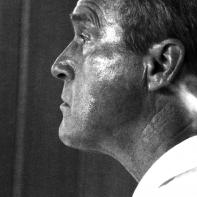 When I’m not writing I go through phases. Vague uneasiness. Mild anxiety. Crankiness. Nasty beating up of my vulnerable self. Days of brooding.
When I’m not writing I go through phases. Vague uneasiness. Mild anxiety. Crankiness. Nasty beating up of my vulnerable self. Days of brooding.
It won’t take much to get me writing again—it can happen any moment. Whatever it is that snaps me back into what I consider my true and best self is almost always random. Past experience has taught me that the solution is just to try to pay attention to the ten thousand things. So I take a lot of walks. In the City Market parking lot I’ll overhear a girl telling a guy to “Shut up!” in a flirtatious way. That afternoon I’ll have a poem I’m just itching to read aloud to somebody.
In the cemetery through which I frequently walk, I’ll notice for the first time a small stone that says “Ida Grace / Born & Died / October 3, 1935.” For decades Ida’s been down there urgently whispering, Ampersand, ampersand! In a lucky instant my ears will pick it up.
On a road trip I’ll notice lines of a Delbert McClinton song on my iPod—“She’s 19 years old / and already she’s lonely.” Shazam! I’ll have a character in my head–a half pretty and brooding kind of young woman—who’s definitely worthy of a short story and maybe even a novel.
These gifts won’t come along because I’m anxious or cranky or brutally self-critical. They will arrive because the world is generous and our lives in it are infinitely worthy of attention. The best of what I see sometimes comes catty-corner–from off to the side of where I’ve been looking.
But time is stretching out. The last piece I drafted all the way to the end was back in July, and now October’s started saying its goodbyes. I’ve gone through worse stretches, but this is extreme. Last week I decided I had no choice. I have to embrace Not Writing, make her my girlfriend, tell her that in spite of my moodiness I really, actually like her. So I’m taking her on my walks, reading to her in bed, bringing her coffee in the morning. She’s not much for talking, but now and then I get a quick grimace that could be her version of a smile.
Now that Not Writing is my girlfriend, everything I see and hear and smell and taste is intense and radiant. The mockingbirds aren’t just flying and singing–they’re gliding through my dreams. The traffic on Madison Street isn’t just noise and speed, it’s an atrocity that prophesies a future full of rage. This world wants an Old Testament prophet. Out there in the middle of the street, I’ll shake my fist and scream at the cars. They’ll swerve around me and won’t slow down. Out there in the street I’ll be crazy alive.
My girl? For a few days now she’s been making plans to leave town. Having bitten the inside of her lip until it’s sore, now she’s thinking maybe she needs to start smoking. She’s never liked the smell of cigarettes, but she already likes whiskey, and she wants to taste bourbon and smoke simultaneously. She takes a sip, then a drag, inhales, exhales. I’m still lonely, she says and hangs her pretty head. Oh I can tell you this! If I weren’t a writer–if I didn’t believe that I’m on the verge of drafting up something that’s bound to be really good–I’d be a dead guy.